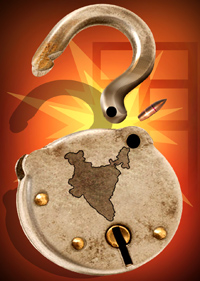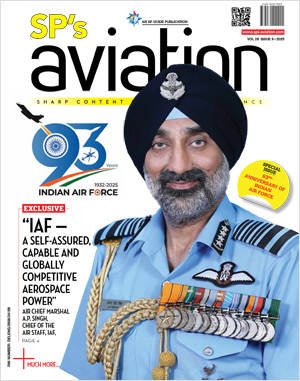INDIAN ARMED FORCES CHIEFS ON OUR RELENTLESS AND FOCUSED PUBLISHING EFFORTS

The insightful articles, inspiring narrations and analytical perspectives presented by the Editorial Team, establish an alluring connect with the reader. My compliments and best wishes to SP Guide Publications.

"Over the past 60 years, the growth of SP Guide Publications has mirrored the rising stature of Indian Navy. Its well-researched and informative magazines on Defence and Aerospace sector have served to shape an educated opinion of our military personnel, policy makers and the public alike. I wish SP's Publication team continued success, fair winds and following seas in all future endeavour!"

Since, its inception in 1964, SP Guide Publications has consistently demonstrated commitment to high-quality journalism in the aerospace and defence sectors, earning a well-deserved reputation as Asia's largest media house in this domain. I wish SP Guide Publications continued success in its pursuit of excellence.
- A leap in Indian aviation: Prime Minister Modi inaugurates Safran's Global MRO Hub in Hyderabad, Calls It a Milestone
- All about HAMMER Smart Precision Guided Weapon in India — “BEL-Safran Collaboration”
- India, Germany deepen defence ties as High Defence Committee charts ambitious plan
- True strategic autonomy will come only when our code is as indigenous as our hardware: Rajnath Singh
- EXCLUSIVE: Manish Kumar Jha speaks with Air Marshal Ashutosh Dixit, Chief of Integrated Defence Staff (CISC) at Headquarters, Integrated Defence Staff (IDS)
- Experts Speak: G20 Summit: A Sign of Global Fracture
Dead Till the Next Attack

The Indian government’s response to 26/11 was embarrassingly defensive and devoid of the slightest hint of capability or intention of resolute action beyond a bland all options open syndrome.
Bomb blasts and terrorist attacks appear to have become a routine feature in India. Almost as soon as the debris is cleared and the blood stains washed off the streets, the carnage recedes from public memory into oblivion. In the last three years, there have been over 16 incidents in which hundreds of innocent lives have been lost apart from damage to property and disruption of livelihood. Such incidents are regarded as problems related to internal security and statistical records are updated accordingly. Instead of bringing the real culprits to book, investigations and subsequent actions often degenerate into motivated and petty political controversies detracting from the core issues involved.
The 26/11 episode, however, was different in character from the routine though somewhat similar to the attack on Parliament in 2001. A blatant and brutal assault on the sovereignty of the nation, the Mumbai episode was, in essence, a military operation exceptionally well planned and executed with incredible audacity without concern for reprisal or escalation. The impact of the mission was magnified as the targets were distinctly high profile. The victims included many from the affluent segments of society as also eminent citizens from abroad. Reeling under the impact of global economic meltdown, the financial capital of India lay traumatised by this rape and the intelligence/security apparatus of the nation stranded without the proverbial fig leaf.
What is more disconcerting is the response to the crisis. Isolated acts of bravery notwithstanding, the absence of a coherent counter terrorist strategy and the lack of capability of the civil police to handle the situation were glaring. There was also tragic lack of professionalism in the encounter in which three highly rated senior police officials of the Anti-Terrorist Squad, a specialised outfit created to tackle such incidents, totally misread the situation and fell victim to terrorist bullets without a fight. Deployment of the Indian Navy Commandos was delayed on account of bureaucratic hassles that exist in any effort at coordination between the state and central agencies. There was inordinate delay in the arrival of the National Security Guard perhaps for the same reason. The infantry battalion of the Indian Army located in Mumbai which is experienced in combating terrorists in Jammu and Kashmir was conspicuous by its absence—perhaps not requisitioned at all. Evidently, not only were the intelligence agencies defeated in their own homeland, response from the security agencies lacked speed, centralised control/direction, cohesion and coordination. Besides, operating at a low level of technology in respect of weapons and other systems, security forces were clearly handicapped vis-à-vis the intruders.





